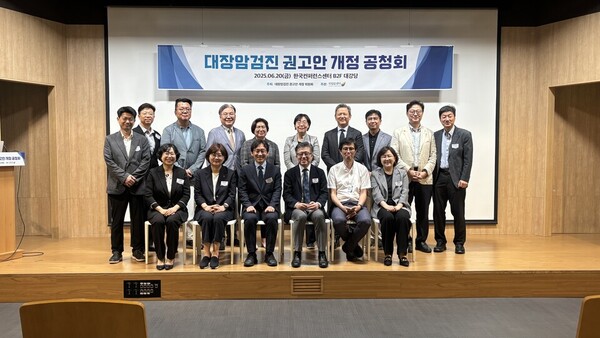The first revision of national colorectal cancer screening recommendations in a decade is highlighted by the inclusion of colonoscopy as the primary screening method.
The inclusion has also increased the likelihood of colonoscopy becoming a standard part of national cancer screening.
The National Cancer Center said Monday that it held a public hearing on June 20 on the revision of the National Colorectal Cancer Screening Recommendations and released a draft of the revision, which was prepared according to international standard methodology. The National Colorectal Cancer Screening Recommendations were first developed in 2001 by the National Cancer Center and related societies, and were revised in 2015

The first revision in a decade recommends colonoscopy as the primary screening method, along with the Fecal Immunochemical Test (FIT). The recommended age for screening was reduced from 45 to 80 years of age to 45 to 75 years of age. The recommended screening interval for colonoscopy is now 10 years. The FIT’s interval remains the same at one to two years.
The recommendations will be finalized after further review.
The revisions used the internationally recognized Grading of Recommendations Assessment, Development and Evaluation (GRADE) methodology. Following the GRADE methodology, the committee developed the revisions by: systematically searching and screening the literature; assessing the certainty of the evidence (high/moderate/low/very low); weighing the benefits and risks; reflecting patient values and preferences; using resources; and determining the strength of the recommendation (strong recommendation/optional recommendation).
The public hearing discussed quality control measures when introducing colonoscopy, securing screening quality by limiting the number of examinations, the need to establish a complication management system, the cost burden of each screening method, and how to provide information to the public.
“The revised recommendations are the result of an extensive literature review, meta-analysis, simulation modeling analysis, and data analysis of Koreans,” said Dr. Cha Jae-myung, chair of the revision committee.
National Cancer Center Director Yang Han-kwang said, “This recommendation revision and public hearing is an example of Korea's medical advancement. Just as gastroscopy has a high early detection rate of 70 percent for gastric cancer, the introduction of colonoscopy as a national screening will be a breakthrough in colorectal cancer prevention and early detection.”
Related articles
- Endoscopic cancer screening may be ineffective for people over 80: study
- Blood tests may replace colonoscopy for colorectal cancer screening in Korea
- New index predicts colonoscopy risks in older adults: study
- Ainex's AI colonoscopy software named as innovative medical device by MFDS
- Korea's colorectal cancer screening rate hits record high in 2024, driven by colonoscopy inclusion
- Stomach cancer survival highest with chemo within 6 weeks of surgery

